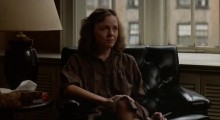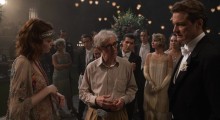Woody Allen
-
Moment of Conception

“All it takes is one good egg.” This refrain is uttered more than a few times throughout the course of Tamara Jenkins’s Private Life, her first feature since 2007’s The Savages. A meditation on marriage, middle age and the haves and have-not’s of fertility, the film stars Kathryn Hahn and Paul Giamatti as an artist couple—she’s a writer, and he runs both a theater group and an artisanal pickle company—desperate to conceive in their 40s. While the pair loads up on IVF hormones and diminishing hopes, they must also make room in their realistically cozy East Village apartment for their […]
by Sarah Salovaara on Sep 17, 2018 -
The Yakuza, Interiors and Chilly Scenes of Winter: Jim Hemphill’s Home Video Picks

Sydney Pollack’s The Yakuza (1975) is an idiosyncratic but fascinating blend of incongruous tones made all the stranger by the difference in sensibilities among the men behind the camera. The film started as a script by brothers Paul and Leonard Schrader, who sold it for a boatload of cash thanks to the high-concept premise: an ex-soldier from the U.S. travels to Japan and infiltrates the underworld in a mash-up of the American action flick and the Asian martial arts film. Once Pollack came on board to direct the movie became something less commercial but, in its way, more compelling; uncomfortable […]
by Jim Hemphill on Mar 3, 2017 -
Jim Hemphill’s Best Blu-rays of 2016

To finish off 2016, I’d like to round up some of the year’s best Blu-ray releases that I didn’t get a chance to cover in my weekly column. It was an exceptional year for physical media thanks to labels like Criterion, Twilight Time, Arrow, Kino Lorber, and Olive, all of which continue to license neglected titles from studio vaults and give them the first-class treatments they deserve. While the list below barely scratches the surface of the efforts of these companies and others, it contains what I consider to be the most essential discs of the year — movies that […]
by Jim Hemphill on Dec 30, 2016 -
Watch: Why Gordon Willis’ Lighting in Interiors is Another Character Element

In conjunction with the Museum of Moving Image’s first ever cinematographer-centric retrospective, Reverse Shot has produced a small tribute to Gordon Willis’ work on Woody Allen’s Interiors. Staging their own recreations of the film’s many portraits, editors Michael Koresky and Jeff Reichert examine how Willis’ lighting contributes to the emotional interiority of Diane Keaton’s character, Renata. By casting her in shadows for the majority of the film, Willis reinforces her isolation. It’s an important consideration of how cinematography can not only set the external tone of a film, but also play a necessary role in the characterization of its inhabitants.
by Sarah Salovaara on Feb 20, 2015 -
Woody’s Magic Routine

At the end of Manhattan, perhaps Woody Allen’s masterpiece, he lies on a couch and lists all the things that make life worth living. As a twelve-year-old, I thought it was the coolest and hippest list I’d ever heard. Groucho Marx, Willie Mays, the second movement of the Jupiter Symphony, Louis Armstrong’s recording of Potato-head Blues, Swedish movies, Sentimental Education by Flaubert, Marlon Brando, Frank Sinatra, those incredible apples and pears by Cézanne, the crabs at Sam Wo’s, and Tracy’s face. But as I’ve gotten older, I see that list differently. It’s a list to reaffirm a sense of self. […]
by Noah Buschel on Aug 18, 2014 -
What the Olympics and Nazis Can Teach Us About Woody Allen and Women Directors

One friend on Facebook mentioned that offering an opinion on the Woody Allen scandal is like sticking your head into a turboprop plane on takeoff. That’s nothing — I say we might as well stick our collective heads into an Airbus A380 jet engine by throwing into the discussion the Olympics, Nazis, the scarcity of women directors and the Hollywood Blacklist. Let’s bring on the awkward! You see, last July, Entertainment Weekly — arguably the only national popular magazine devoted in large part to film coverage and criticism — did a list of their “All-Time Greatest Movies.” To be sure, […]
by Dan Mirvish on Feb 23, 2014 -
“The Past is Never Past,” but the Faulkner/Midnight in Paris Lawsuit Is.

One of the most vexing and unanticipated problems facing independent filmmakers involves realizing that brief, seemingly incidental references — a song lyric, the quoting of a movie character, or referencing a line from a novel — are actually copyrighted materials requiring clearance. Yes, there is what’s known as Fair Use — a doctrine allowing selective quotation of copyrighted works. But Fair Use is most often used in documentary and less so in fiction works. But a recent court ruling involving a William Faulkner line quoted in Woody Allen’s Midnight in Paris offers hope to filmmakers. This problem of quote clearance […]
by Scott Macaulay on Jul 24, 2013 -
2 Days in New York — A Hammer to Nail Review
(2 Days in New York world premiered at the 2012 Sundance Film Festival and was picked up for distribution by Magnolia Pictures. It is available through various VOD outlets—Amazon, iTunes, etc.—on July 6, 2012, and opens theatrically on August 10, 2012. Visit the film’s official website to learn more.) I’ve been known to knock the French, toodling around on bicycles with their phallic baguettes, vin rouge, and perennial boredom with all things Americain. But is there any way to withstand the Julie Delpy charm offensive? She had me at bonjour in this witty comedy, a sequel to her earlier film 2 Days in Paris. Delpy (who wrote and directed the film) […]
by Susanna Locascio on Aug 9, 2012 -
LAFF 2012: FAMILY MATTERS
The North American premiere of Woody Allen’s To Rome with Love was the big to-do Thursday night in downtown Los Angeles, and not just because it opened the L.A. Film Festival: Allen doesn’t often visit the city (not even when nominated for an Oscar), making his personal introduction of this latest work something of a coup for the fest. And while it would be wrong to call a new film by the endlessly prolific director a cinematic “event” in the same vein as, say, the arrival a new Terence Davies project, so too would it be wrong to think it […]
by Michael Nordine on Jun 19, 2012 -
The Microbudget Conversation : Ex Girlfriends

Earlier this month I had the opportunity to take a master class with Ted Hope and Christine Vachon. Now out of respect to them I will not reveal all that was discussed, but what I can tell you is that my perspective of things has been altered quite a bit. I first started this blog with the intention of showcasing microbudget work as the passionate filmmaking it is…and fuck the rules. (The whole series of manifestos is evidence of that.) We were making cinema fast and cheap, and we needed to completely re-write the rules; a message that can be […]
by John Yost on Nov 15, 2011
